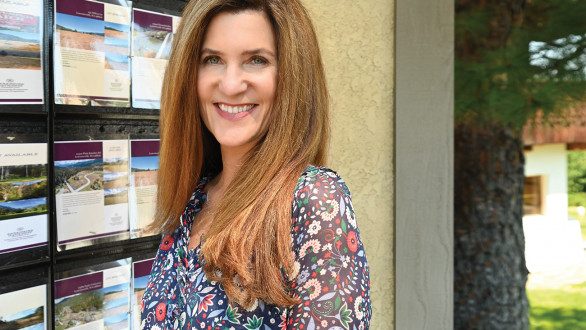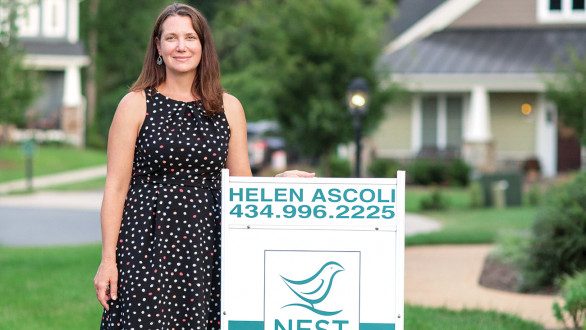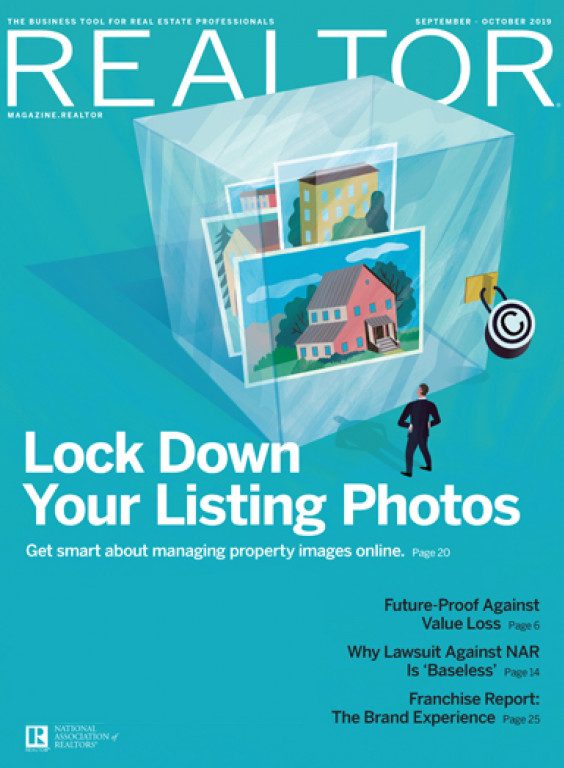When Charlie Upchurch’s father affiliated his Athens, Ga., brokerage with Coldwell Banker in 1982, the deciding factor was the franchise’s rock-solid ownership by a financial giant.
“He’d been approached by a lot of franchises back in the early ’80s when they were really starting in real estate because we had the largest market share in the area,” Upchurch recalls. “He told me he joined Coldwell Banker because it was backed by the Sears Financial Network.”
It’s not lost on Upchurch—who joined his father’s company in 1985 and purchased it in 1997—that Sears is not the giant it once was and its financial network is a mere memory, but his company and the national Coldwell Banker franchise, now part of global franchisor Realogy, are still industry leaders. Careful recruiting practices and attention to branding standards are among the hallmarks of the brand. “One of the things that has continued to attract me to Coldwell Banker is that, unlike a lot of the real estate franchises that will let anybody represent their flag even today, Coldwell Banker doesn’t want anybody and everybody in its network,” he says.
Upchurch’s longevity with Coldwell Banker is typical of the brand where brokerage affiliations average 22 years, the longest reported in REALTOR® Magazine’s 2019 Residential Franchise Report.
That’s just one of the noteworthy trend lines in the report. At a time when office expansion is essentially flat at many companies, a few briskly growing outliers stood out, including Berkshire Hathaway HomeServices, which added 16,000 new agents over the past two years—a jump of 15%—and 140 new offices. NextHome’s agent ranks more than doubled to 3,200 as 150 new offices opened since the magazine’s 2017 report. And the industry remains dynamic, with newer companies—such as Nest, which launched in 2008 and began franchising in 2017—making a mark in their markets.
NAR data shows that only 11 percent of all brokerages were affiliated with a franchise company in 2019. That’s down slightly from 13 percent two years ago. However, franchises still represent a wide swath of NAR members. More than 40 percent of REALTORS® are affiliated with one. Here are the stories of Upchurch and two other real estate pros who’ve found the franchise life to be the right path for them.
In for the Long Haul
Upchurch says he has never once considered leaving Coldwell Banker. He owns not just a residential franchise with 115 agents but also a 10-agent commercial franchise.
It’s primarily the brand’s reputation that keeps Upchurch happy. “It has people who will do business right and who have high morals and standards,” he says.
Upchurch applauded recently when he heard that Coldwell Banker had cut loose a brokerage for not adhering to its standards. “Coldwell Banker took the franchise away from a company because the broker wasn’t keeping up with property identification standards,” he says. “The broker was ‘loosey goosey’ about the way they were doing their business. It wasn’t that Coldwell Banker didn’t renew the franchise—it yanked the franchise.”
When Upchurch travels to other cities, he considers it an advantage that he can instantly recognize Coldwell Banker advertising. “Identity standards mean a lot to me,” he says. “There are other companies that don’t have standards for their signs. You can see a sign on a property, but until you get right up on it, you can’t tell it’s from a national company. That’s fine with me because I think they’re diluting their strength and brand.
I don’t want us doing that.”
Coldwell Banker has been “tinkering” with services lately, Upchurch reports, and he’s pleased with the results. “I don’t want to sound like a company spokesperson, but they know the pressures we brokers are feeling,” he says. “They’re asking, ‘What if we did this? Or this?’ ”
The franchise has begun offering predictive analytics and seller leads, which Upchurch appreciates being able to pass onto his agents. In the past year, Upchurch has welcomed back three agents who had left his company. They cited the high value of those amped-up services in their decision to return.
If Upchurch ever changed course, he says he’d stay with a national franchise. “If you’re talking about predictive analytics or a national website presence, those are things I can’t do on my own,” he says. “They’re things I don’t have to worry about. All I have to worry about is my market and my agents.”
The Appeal of a High-Flying Brand
Lynn Stoddard had looked into uniting her brokerage with a national franchise in the past, but each franchise she’d investigated had a minimum agent quota. The idea of bulking up on sales associates before her company was ready to affiliate them just to meet franchise minimums was a deal breaker for Stoddard.
“When I was researching franchises, I came to the understanding that I had to be big to become a franchise, so I put the idea on the back burner,” says Stoddard, now broker-owner of the 12-person Berkshire Hathaway HomeServices Leavenworth Properties in Leavenworth, Wash.
“I didn’t want to just grab 30 people,” says Stoddard. “I’ve seen brokers do that, and you can’t serve your agents well. The failure rate for agents in this industry is pretty high, and we’re really conscientious of that fact. Right now, we’re training two new agents, and that’s a full-time job.”
However, in early 2018, Berkshire Hathaway HomeServices began wooing Stoddard and her three co-owners (her husband, Dwight Stoddard, and Kevin and Cami Lynch). “It wasn’t a company I had on my radar prior,” she states. “To be honest, your ego is tied up in what you’ve accomplished on your own, and the franchise fee is significant.”
BHHS won them over in November 2018 by promising to allow them to continue to grow at their own pace. “That was the head turner for us,” recalls Stoddard. “I’d assumed all franchises needed a certain minimum number of agents, and we were pleasantly surprised to find that wasn’t the case.”
Another draw was the franchise’s image. Stoddard says three of her million-dollar-plus listings were the direct result of sellers’ placing value in the franchise’s brand. “I think it’s helped us secure more listings than we would have otherwise,” she says.
The “technical toolbox,” as Stoddard calls it, is an advantage and a challenge at the same time. “We realized we needed the horsepower to stay in front of the industry and to stay on top of education,” she says. “But it’s still a learning curve. The toolbox Berkshire Hathaway provides is there, and we’re using bits and pieces of it. It’s going to be a slow, steady process,” she says. “We’re staying true to what we’ve always believed in, and that’s growing on a one-by-one basis. I think they’re quite fine with that.”
Choosing an Emerging Player
For agents, the decision to join a franchise is less complicated. When Helen Ascoli neared her five-year mark in real estate, she was affiliated with a 25-to-30-salesperson independent brokerage in Charlottesville, Va. She began thinking about where she wanted to take her career. Her recurring thoughts were: Do I want to move? What feels right in growing my business?
She found her answers with a company, Nest Realty, that’s based in Charlottesville. “It’s funny because I don’t even think of Nest as a franchise,” she says. “I know it is, but it’s so hands-on and so grassroots that it doesn’t feel like a franchise.”
It was the skills of Nest agents in her areas that convinced Ascoli to make the move. “My previous broker is one of the top in the area, and that made me be very selective,” she explains. “It’s always been in the back of my mind that if I were ever to leave, Nest would be the top place I’d want to go.”
Ascoli recalls three “sticky” transactions she dealt with in the past year—before making the move. The Nest agents on the other side of each transaction were calm as they and Ascoli worked together to find resolutions that made all parties happy. “It was similar to how I think,” she says.
Ascoli was also drawn to Nest’s approach to marketing, an area she believed she needed help on to increase her sales. She’s particularly happy with Nest technology that combines transaction management with a marketing database, something she didn’t have before. The franchise’s marketing team organizes campaigns and sends reminders when, for example, it’s time to send mailers to clients. She finds the branded pieces prompt prospects to reach out to connect with her. “We have mailers that go out to our current client base, whom we’re keeping in touch with,” she says. “We also had a summer tote bag you could take to the pool that we could personalize with our own message. I had about five clients who were so thankful that they contacted me.”
Marketing and technology are more expensive at Nest than what she was paying before, but she finds it worth it. “It’s not too much of a change in terms of what I’m paying my broker,” she explains. “But had I been keeping up with marketing on my own, I’d have been spending that extra money, anyway. They’re prompting me to do what I need to grow. It’s about more than money.”
Business so far this year is slower than Ascoli expected. But she predicts that by year’s end, her sales will beat her 2018 total due to her stepped-up marketing efforts.
“The biggest learning curve has been coming from a place that didn’t have technology to a place that has something online for everything,” says Ascoli. “That’s part of the reason I came here.”







